

Antibiotics Use in U.S., China Farms Can Lead to Public-Health Crisis. Back in 2005, when I was a reporter based out of TIME’s Hong Kong office, I spent more time than I care to remember in the backyard chicken farms of Asia.
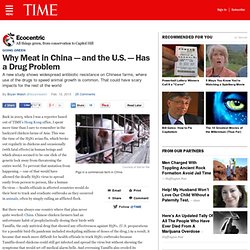
This was the time of the H5N1 avian flu, which broke out regularly in chickens and occasionally (with fatal effects) in human beings and which always seemed to be one click of the genetic lock away from threatening the entire world. To prevent that mutation from happening — one of that would have allowed the deadly H5N1 virus to spread easily from person to person, like a human flu virus — health officials in affected countries would do their best to track and eradicate outbreaks as they occurred in animals, often by simply culling an afflicted flock.
But there was always one country where that plan never quite worked: China. The Breakthrough Institute: Buddhism, Nihilism, and Deep Ecology. Carbon-sucking trees.
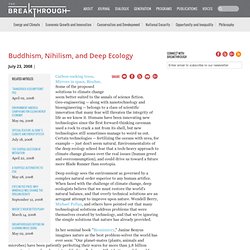
Mirrors in space. Biochar. Some of the proposed solutions to climate change seem better suited to the annals of science fiction. Geo-engineering -- along with nanotechnology and bioengineering -- belongs to a class of scientific innovation that many fear will threaten the integrity of life as we know it. Humans have been innovating new technologies since the first forward-thinking caveman used a rock to crack a nut from its shell, but new technologies still sometimes manage to weird us out.
Deep ecology sees the environment as governed by a complex natural order superior to any human artifice. In her seminal book "Biomimicry," Janine Benyus imagines nature as the best problem-solver the world has ever seen: "Our planet-mates (plants, animals and microbes) have been patiently perfecting their wares for more than 3.8 billion years...turning rock and sea into a life-friendly home.
Nietzsche argued that emulating nature means living a life of indifference: Breakthrough in the Macondo Mystery: BP Admits to New Activity at Deepwater Horizon Site. Finally, some answers.
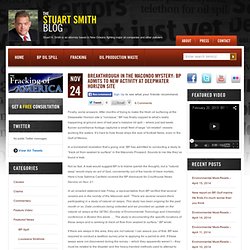
After months of trying to make the fresh oil surfacing at the Deepwater Horizon site a “nonissue,” BP has finally copped to what’s really happening at ground zero of last year’s massive oil spill – where just last week, flyover surveillance footage captured a small fleet of large “oil-related” vessels working the waters. It’s hard to hide those ships the size of football fields, even in the Gulf of Mexico. The Dangers of Nuclear Power: An Open Letter to Physicists. Biological Ignorance The history of atomic energy is one of repeated over-optimism, especially with regard to biological effects.
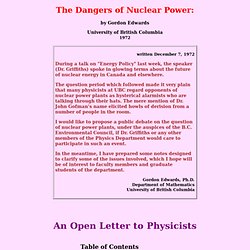
Part of the reason for this, no doubt, is that physicists don't generally know very much biology. Nuclear physicists, for example, rarely spend a significant portion of their careers in the study of the biological effects of radiation. One of the factors that is often ignored in talking about the release of low-level radioactive wastes into the environment is the fact that biological organisms can concentrate those wastes to a dangerous level. During the atmospheric testing of the 1950's, the Atomic Energy Commission predicted (correctly) that much less fallout would reach the ground in arctic regions than in temperate regions of the United States. Singing for Peace and Coffee in Uganda.
Jeffrey Summit, G88, G95, brews a pot of coffee each morning, savoring the aroma of the dark roast, a fair trade coffee from Uganda.

It has a slightly smoky taste, with a touch of brown-sugar sweetness. It is the only coffee that Summit, Tufts Jewish chaplain and executive director at Tufts Hillel for 34 years, buys. The beans unite three of his favorite interests: coffee, music and world peace. The coffee is grown by more than 1,000 Christians, Muslims and Jews who live in a rural region of southeastern Uganda and are members of a fair trade cooperative called Peace Kawomera—kawomera means “delicious” in Luganda. These farmers also make music together, music that Summit found so inspirational that he had to record it and share it with the world.
Metaphysics of Gaia. Philosophy Discussion on One Cosmos: Gaia Nature Evolution. Gaia Hypothesis. Deep Ecology Movement: Arne Naess Pictures, Quotes, Ecosophy. Arne Naess & The Deep Ecology Movement Pictures, Quotes, Ecosophy What is wrong with our culture is that it offers us an inaccurate conception of the self.
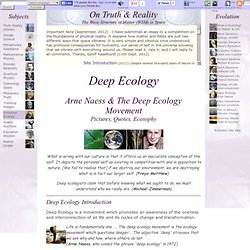
It depicts the personal self as existing in competition with and in opposition to nature. Evolution Ecology Nature: Discussion Metaphysics of Ecology, Nature, Ecological Interconnection. Metaphysics / Philosophy of Evolution, Ecology (Ecological Interconnection) & the Importance of Nature.
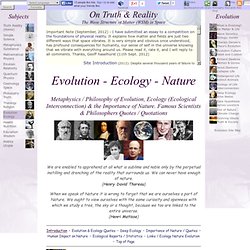
Famous Scientists & Philosophers Quotes / Quotations. Is There an Ecological Unconscious? Cane Toads: An Unnatural History 1/5. Cane Toads: An Unnatural History 2/5. Cane Toads: An Unnatural History 3/5. Cane Toads: An Unnatural History 4/5. Cane Toads: An Unnatural History 5/5. Profit motive has no conscience. Economy. Politics. La Via Campesina : International Peasant Movement. Non-GMO Project. Organic Consumers Association. Food Voices: Stories of the Food Sovereignty Movement From Around the World.
National Family Farm Coalition. Food Organizations. Because your food choices can change the world. Sustainability Disclosure Database - Home. Plastic Manners. Taina Uitto , a Vancouver-based environmentalist and blogger, has taken on a challenge most of us would find daunting: living for a year without any plastics.
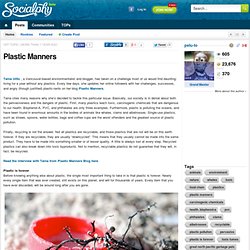
Every few days, she updates her online followers with her challenges, successes, and angry (though justified) plastic-rants on her blog Plastic Manners. Taina cites many reasons why she’s decided to tackle this particular issue. Basically, our society is in denial about both the pervasiveness and the dangers of plastic. First, many plastics leach toxic, carcinogenic chemicals that are dangerous to our health. Bisphenol-A, PVC, and phthalates are only three examples. Finally, recycling is not the answer. Read the interview with Taina from Plastic Manners Blog here Plastic is foreverBefore knowing anything else about plastic, the single most important thing to take in is that plastic is forever.
Plastics polluteSingle Use plastics and disposable plastics are the main source of plastic pollution. link: link: link: